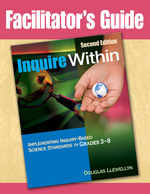
Hands-on, Practical Guidance for Educators
From math,
literacy, equity, multilingual learners, and SEL, to assessment, school counseling,
and education leadership, our books are research-based and authored by experts
on topics most relevant to what educators are facing today.
Facilitator's Guide to Inquire Within, Second Edition
Demonstrate key strategies for cultivating learners' sense of discovery and advancing student achievement in science!
This facilitator's guide helps staff developers and workshop leaders facilitate book study groups, seminars, and professional development events that demonstrate how teachers can implement inquiry-based instruction in the classroom. Facilitators will be able to help teachers understand how children learn science, what scientific inquiry actually is, and what an inquiry-based science classroom looks like. Teachers will discover how to:
- Cultivate a classroom culture of inquiry
- Design investigations or translate existing activities into inquiry-based learning experiences
- Integrate inquiry instruction with grade-level curricular objectives
- Grade Level: PreK-12, Elementary, Secondary
- ISBN: 9781412965828
- Published By: Corwin
- Year: 2008
- Page Count: 56
- Publication date: September 29, 2008
Price: $21.95
For Instructors
Other Titles in: Science | Multimedia Kits & Facilitator's Guides | Teaching Methods & Learning Styles


